The best criminal justice schools will implement a well-structured and accredited criminology program.
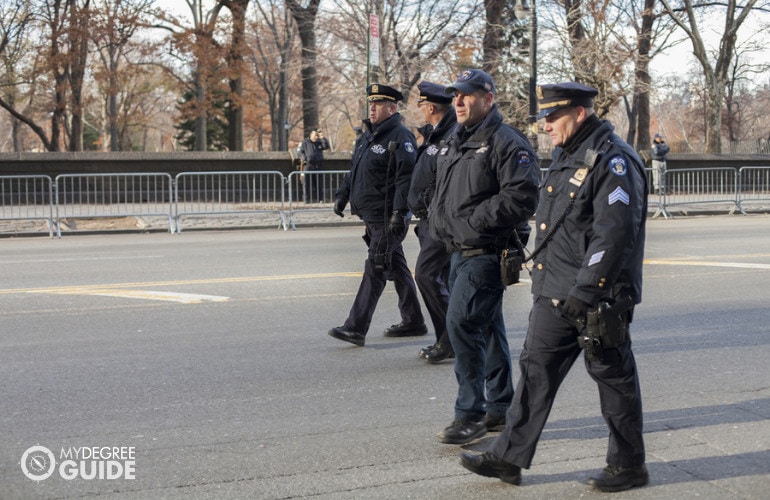
The field of criminal justice incorporates and examines broader knowledge about crime and criminals. Studying this field at either on-campus or online programs can help you become adept in critical thinking and fluent in key legal concepts.
Editorial Listing ShortCode:
To determine which of the top criminal justice schools is best for you, you can research the various degrees and majors offered by prospective institutions to see how they could springboard your personal career goals and aspirations.
Best Colleges & Universities Offering Bachelors in Criminal Justice Degree Programs
Methodology: The following school list is in alphabetical order. To be included, a college or university must be regionally accredited and offer degree programs online or in a hybrid format.
Boston University
Boston University offers a Bachelor of Science in Criminal Justice. To graduate, students must complete 128 credit hours while maintaining a grade of C or better in all major-related courses. To be eligible for this criminal justice degree program, applicants must have a high school diploma or GED certificate with a GPA of 2.5 or higher and submit a personal statement.
Boston University is accredited by the New England Commission of Higher Education.
CUNY John Jay College of Criminal Justice
CUNY John Jay College of Criminal Justice offers a Bachelor of Science in Criminal Justice Institutional Theory and Practice and a Bachelor of Arts in Criminal Justice. Both programs require 120 credit hours to graduate. Those in the BS in criminal justice program may apply for an internship. Applicants must submit official high school transcripts and ACT or SAT scores.
John Jay College of Criminal Justice is accredited through the Middle States Commission on Higher Education.
Florida Agricultural & Mechanical University
Florida Agricultural and Mechanical University offers a Bachelor of Criminal Justice. Students must select a substantive area in Legal Studies, Minority and Gender, Juvenile Justice, or Corrections. An internship may be added to the degree. Applicants must submit two letters of recommendation, an essay, and SAT or ACT scores.
FAMU is accredited by the The Commission on Colleges of the Southern Association of Colleges and Schools.
Florida State University
Florida State University offers both online and on-campus programs for a Bachelor’s in Criminology. To graduate, students must complete 120 credit hours while maintaining a GPA of 2.0 or higher. Those interested in the program may apply online through the school’s website with an admissions essay and a resume. GPA, ACT, and SAT scores must be self-reported.
Florida State University is accredited by the Commission on Colleges of the Southern Association of Colleges and Schools.
Liberty University
Liberty University offers a Bachelor of Science in Criminal Justice that can be completed online or in person. A total of 120 credit hours are needed to graduate. Online classes are 8 weeks long. Those interested in this criminal justice degree program must submit their high school transcripts or GED, an application essay, and ACT, SAT, or CLT test scores.
Liberty University is accredited by the Southern Association of Colleges and Schools Commission on Colleges.
Michigan State University
Michigan State University offers a Bachelor of Arts in Criminal Justice. Students must complete 120 credit hours to graduate. To be eligible for the program, applicants must submit an online application along with an admissions essay, ACT or SAT scores, and high school transcripts.
Michigan State University is accredited by the Higher Learning Commission.
Monroe College
Monroe College offers a Bachelor of Science in Criminal Justice. Students may choose to study online, on-campus, or through a hybrid format. A total of 120 credit hours are required to graduate. Applicants must submit an online application along with an admissions essay and official transcripts. An interview is also required for this BS in criminal justice program.
Monroe College is accredited by the Middle States Commission on Higher Education.
Northeastern University
Northeastern University offers a Bachelor of Science in Criminal Justice. A total of 128 credit hours are required to graduate. Students also have the opportunity to choose whether they wish to complete one or two co-ops in this BS in criminal justice program. Applicants must submit an application along with recommendations from a teacher and a counselor and their official transcripts.
Northeastern University is accredited by the New England Commission of Higher Education.
Ohio State University
Ohio State University offers a Bachelor of Arts in Criminology and Criminal Justice. The program allows students to complete an internship. To graduate, students must maintain a GPA of 2.0 or higher. Those interested in this BA in criminal justice program must first be accepted to Ohio State and complete a pre-requisite sociology class before they can declare their major.
The Ohio State University is accredited by the Higher Learning Commission.
Pennsylvania State University
Pennsylvania State University offers a Bachelor of Arts in Criminal Justice. Students must complete 120 credit hours to graduate. Those interested in this BA in criminal justice program must declare the major in their third semester and have a GPA of 2.0 or higher from all courses taken at the school.
The Pennsylvania State University is accredited by the Middle States Commission on Higher Education.
Sam Houston State University
Sam Houston State University offers both a Bachelor of Arts and a Bachelor of Science in Criminal Justice. Both programs can be completed on-campus or online and require students to complete 120 credit hours to graduate. Applicants must apply online through the school’s website and submit copies of their official transcripts.
Sam Houston State University is accredited by the Southern Association of Colleges and Schools Commission on Colleges.
St. Mary’s University
St. Mary’s University offers a Bachelor of Arts in Criminal Justice. Students must complete 120 credit hours to graduate. Internships are available for interested students. Those interested in this BA in criminal justice program may apply through the school’s website or CommonApp. A personal essay, a letter of recommendation, and a resume must be submitted along with their application.
St. Mary’s University is accredited by the Southern Association of Colleges and Schools Commission on Colleges.
Temple University
Temple University offers a Bachelor of Arts in Criminal Justice. To graduate, students must complete 123 credit hours with a minimum GPA of 2.0. Applicants must have a high school GPA of 3.0 and need to submit an online application and an admissions essay. Standardized test scores and letters of recommendation are optional but accepted for consideration.
Temple University is accredited by the Middle States Association of Colleges and Schools.
University of Baltimore
The University of Baltimore offers a Bachelor of Science in Criminal Justice with concentrations in Law Enforcement, Courts and Law, and Corrections. To graduate, students must complete 120 credit hours. Applicants must submit a personal essay, official transcripts, and a letter of recommendation. While standardized test scores are optional, they are needed for scholarships.
UB is accredited by the Middle States Commission on Higher Education.
University of California – Irvine
The University of California—Irvine offers an undergraduate major in criminology, law, and society. Students must complete 180 quarter credit hours over the course of 3 or 4 years to graduate. Those interested in the program must first be accepted into the school before submitting their high school transcripts.
UCI is accredited by the Western Association of Schools and Colleges Senior College and University Commission.
University of Cincinnati
The University of Cincinnati offers a Bachelor of Science in Criminal Justice for students interested in studying online or on campus. Students must complete 120 credit hours to graduate. To be eligible for the program, applicants must have a GPA of 2.0 or higher and appropriate ACT or SAT test scores.
The University of Cincinnati is accredited by the Higher Learning Commission.
University of Florida
The University of Florida offers an undergraduate degree in criminology programs. Students must complete 60 credit hours of lower-level courses with a minimum GPA of 2.8 before they may begin taking upper-level courses. Those interested in the program must submit an online application along with official transcripts and ACT or SAT test scores.
The University of Florida is accredited by the Southern Association of Colleges and Schools Commission on Colleges.
University of Maryland
The University of Maryland offers a criminology and criminal justice undergraduate degree. Students must complete 120 credit hours to graduate. Those interested in the program may either apply for the program in their initial application or transfer into the program by the end of their first semester at the school.
The University of Maryland is accredited by the Middle States Commission on Higher Education.
University of Miami
The University of Miami offers a Bachelor of Arts in Criminology. To graduate, students must complete 120 credit hours with a GPA of 2.0 or higher. Those interested in the program must submit official high school transcripts, SAT or ACT test scores, and a letter of recommendation.
The University of Miami is accredited by the Commission on Colleges of the Southern Association of Colleges and Schools.
University of South Florida
The University of South Florida offers a Bachelor of Arts in Criminology. The program can be completed online, in person, or through a hybrid course option. A total of 120 credit hours are required to graduate. Those interested in this BA in criminal justice program must submit an application along with copies of their high school transcripts and ACT or SAT scores.
The University of South Florida is accredited by the Southern Association of Colleges and Schools Commission on Colleges.
Best Criminal Justice Schools
The best criminal justice colleges tend to offer a healthy range of program options to choose from. Criminal justice professions are in constant demand, and finding the program that’s right for you can help put you on the path toward educational success.
Select the program that most interests you to jump to that section of the guide:
- Criminal Justice
- Crime Scene Investigation (CSI)
- Homeland Security
- Law Enforcement
- Public Safety Administration
- Corrections
Regardless of the specialty you select, you will still receive a strong foundation in criminal justice and related courses.
Criminal Justice

Criminal justice is the structure of laws, rules, and agencies designed to hold criminals accountable for their misdeeds and to help restore their victims as much as possible.
Students who study criminal justice as their major are typically observant, analytical, and interested in investigations. They also tend to value honesty and integrity, abiding by a strong sense of ethics and moral standards. Because this career field is so broad, a degree in criminal justice can help equip individuals to work in a variety of areas within criminal justice.
Editorial Listing ShortCode:
Career paths can include court-related jobs, such as paralegals, court clerks, victim advocates, and witness coordinators. Law enforcement career paths include police officers, investigators, detectives, and federal agents. Criminal justice majors typically study subjects like police science, psychology, research methods, sociology, criminal investigation, and criminal justice.
Specialized classes may cover topics like criminal justice and corrections, criminal science, forensic science and technology, homeland security, law enforcement, and firefighting.
Crime Scene Investigation (CSI)
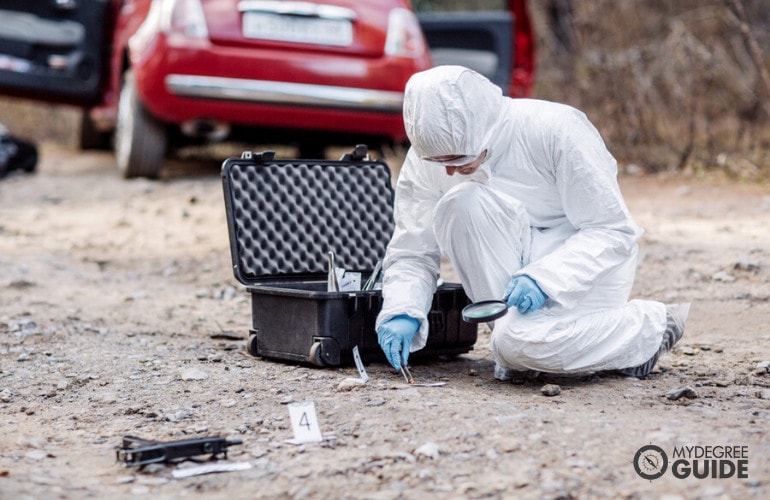
Crime scene investigation (CSI) involves the careful gathering of physical evidence from crime scenes, which is then analyzed at a crime laboratory.
Professionals with a background in this specialty are adept at analyzing key components of physical evidence. Collected evidence is utilized to reconstruct crime scene scenarios and establish a solid case for trial presentations.
This major is heavily focused on research capacities. This can include laboratory science and procedures, evidentiary testing and analysis, record-keeping, reconstruction techniques, and evidence handling and storage.
Editorial Listing ShortCode:
Understanding the organizational and detail-oriented conditions for this career path is crucial for individuals who want to pursue CSI-related jobs. Related careers include forensic artist, firearm specialist, crime scene photographer, evidence collector, and CSI technician.
General topics related to crime scene investigation can include computer applications, criminology, investigative techniques, police science, and sociology. More specialized subjects can include forensic anthropology, law and criminal procedure, evidence photography, and the the techniques of investigating crime scenes.
Homeland Security

Homeland security focuses on security policy, planning, and operations dedicated to the protection of US territory, assets, infrastructure, institutions, and citizens from external threats.
Individuals who study homeland security are diligent to enforce security operations and uphold policies and procedures with integrity. Career paths to consider can range from positions within a local community to more specialized positions for the national government. Related positions include CIA officer, fish and game warden, gaming service worker, detective, and emergency management director.
Editorial Listing ShortCode:
Subjects studied within the realm of homeland security include bioterrorism communications, constitutional law, criminal justice, and cyber-terrorism. Courses can also cover emergency planning, disaster response, public relations, international terrorism, and sociology. The knowledge gained from this type of program can help equip you to ensure the safety of the division you are responsible for maintaining.
Law Enforcement
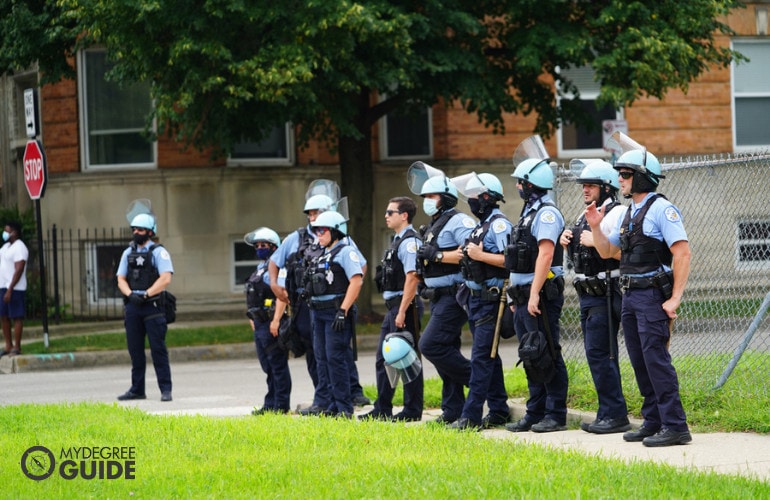
A degree in law enforcement prepares you to apply theories and practices of organization management and criminal justice to the administration of public law enforcement agencies and operations.
If you are interested in pursuing a degree in law enforcement, you’ll be expected to understand the importance of leadership, criminal justice ethics, and public relations. Maintaining the integrity between the community and its authorities is crucial when performing in this field.
Editorial Listing ShortCode:
Topics covered in this degree include budgeting, ethics, management, public relations, law and leadership, public administration, and sociology. While some law enforcement careers may not directly require a degree, having a college degree in law enforcement can boost your potential for career growth and prepare you for a variety of opportunities within the field.
Careers related to law enforcement include loss prevention specialist, border patrol agent, police officer, probation officer, state trooper, document examiner, and crime victims service coordinator.
Public Safety Administration
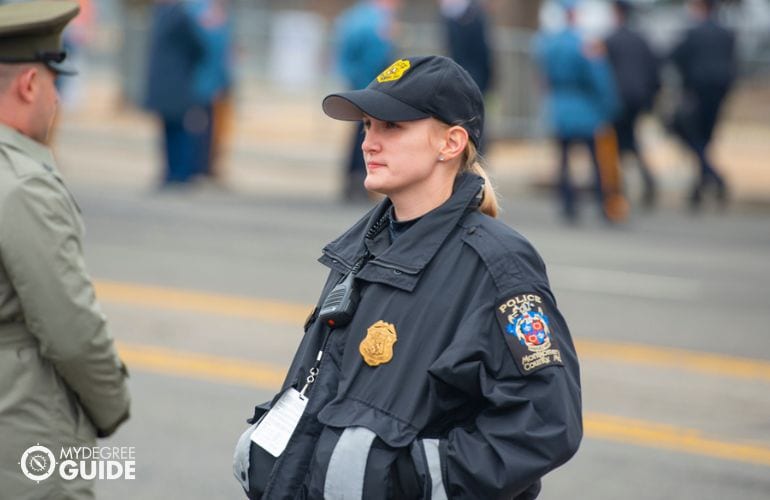
Public safety administration involves emergency preparedness and response—along with the coordination of resources—to critical threats and situations.
Professionals who participate in public safety administration educate and raise awareness of dangers in the community while implementing safeguards to prevent injury and death. Graduates may work in nonprofit organizations, government agencies, and other social and civil service institutions where their services can make a lasting impact.
Editorial Listing ShortCode:
Subjects for this particular degree can include ethics in government, incident management, law enforcement and supervision, introduction to public administration, and public policy analysis. Careers related to this field include police officer, correctional officer, parole or probation officer, tax examiner, and public administrative consultant.
A degree in public administration can also be used to pursue a law degree or another specialized graduate degree path.
Corrections

Corrections involves the security and maintenance of facilities and personnel within local, state, and federal penitentiaries. A career in corrections requires skilled professionals for supervision, enforcement, advocacy, and rehabilitation.
This particular degree will require individuals to be aware of the interpersonal skills, resilience, and empathy that this role demands. Due to the stressful nature of this specialized career path, you will likely encounter various scenarios that may require continual refinement of your perceptiveness surrounding policy regulations and public relations.
Editorial Listing ShortCode:
Subjects related to a degree in corrections include correctional law, ethics in criminal justice, correctional administration, and probation and parole. You may also be able to select courses designed around specific, real-life situations, such as domestic violence or substance abuse intervention.
Careers in corrections include probation officer, prison warden, correctional officer, and police officer. Some careers may not require a four-year degree, but the more education you have within this specialty might allow you to advance more steadily in your role. Some programs offer corrections degree online options for students who prefer this format.
Criminal Justice Careers & Salaries
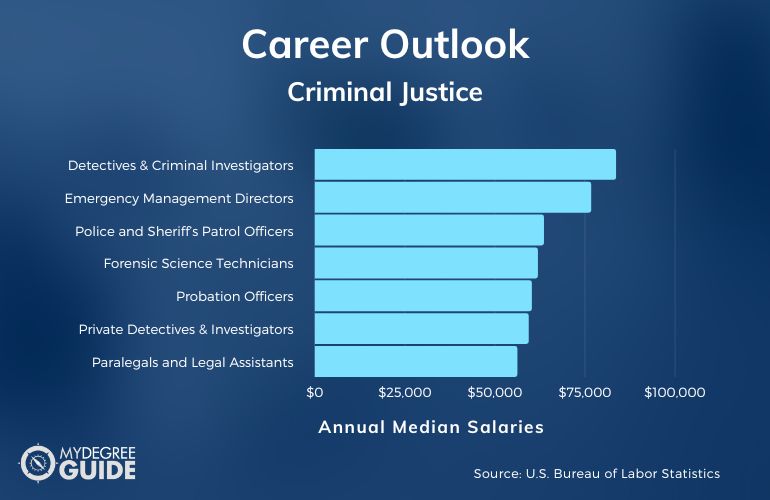
According to the Bureau of Labor Statistics, criminal justice jobs have a steady demand. The sample list below shows some careers that require or acknowledge criminal justice degrees as well as their respective median salaries.
| Careers | Annual Median Salaries |
| Detectives and Criminal Investigators | $83,640 |
| Emergency Management Directors | $76,730 |
| Police and Sheriff’s Patrol Officers | $63,610 |
| Forensic Science Technicians | $61,930 |
| Probation Officers and Correctional Treatment Specialists | $60,250 |
| Private Detectives and Investigators | $59,380 |
| Paralegals and Legal Assistants | $56,230 |
| Social Workers | $50,390 |
| Correctional Officers and Bailiffs | $47,920 |
| Security Guards | $31,470 |
It’s strategic to research all the various requirements and certifications that your career may call for so you can plan your degree path and coursework according to your goals.
Criminal Justice Bachelor’s Curriculum & Courses

There are a few courses that you will most likely experience in a criminal justice bachelors program, regardless of your specialization. These classes can equip you with the foundational skills that employers tend to seek in criminal justice organizations.
- Introduction to Criminal Justice: This class is usually the foundational course in both on-campus or online degree programs and introduces the development and organization of the criminal justice system in the United States.
- Criminology: This course introduces the nature, extent, and factors related to criminal behavior as well as the etiology of criminal offenses and offenders.
- Introduction to Social Problems: This course provides an in-depth study of current social problems, with an additional emphasis on causes, consequences, policy, and possible solutions to these problems.
- Abnormal Psychology: This course examines the nature and causes of various forms of abnormal behavior.
- Computer Concepts: This technical, data-centered course provides an overview of information systems, computers, and technology.
- Criminal Justice Administration: This course includes an overview of management and administration in criminal justice agencies.
- Special Topics in Criminal Justice: This course provides an examination of a specialized topic in the criminal justice field.
- Ethics in Criminal Justice: This course is a study of morality and ethical systems as well as their application to the ethical dilemma encountered by the American criminal justice system.
- Criminal Procedures: This course focuses on the 4th, 5th, 6th, and 14th amendments to the US Constitution.
- Research Methods in Criminal Justice: This introductory research methods course purposes to familiarize students with the language, key concepts, and processes of social science research.
These basic courses are commonly found in schools that offer academic programs in criminal justice. There are also opportunities to study more specialized topics, depending on the area of criminal justice you choose to specialize in.
How to Choose a College with a Criminal Justice Program
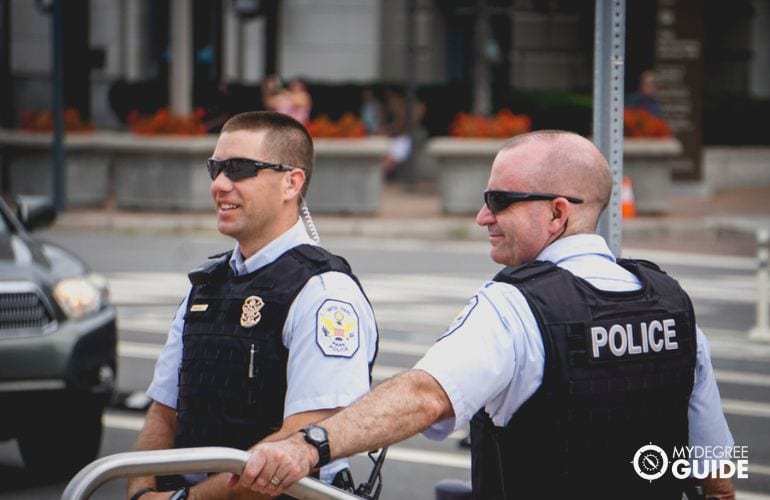
When researching colleges with criminal justice programs, it can help to consider their instructional methods and whether they provide any additional opportunities that promote your educational journey.
Let’s look at some areas to consider:
- Online or on-campus learning. Some programs offer classes in person, fully online, or with a mixture of both.
- Synchronous or asynchronous instruction. Some courses are structured with a set time to attend classes, while others can be taken at any time at the student’s leisure.
- Internships. Depending on the program you choose, an internship that is hosted by a supervisor in criminal justice may be required before graduation.
- Degree level. Some institutions offer a range of degree programs from an associates to a doctorate, while others may only offer undergraduate-level instruction.
- Concentrations. Many top criminal justice schools offer concentrations or specialties in the criminal justice field. You can select a specialization in order to gain more skills in a certain area of study.
You can often preview an institution’s criminal justice program in order to decide if you want to apply there. Understanding these considerations may help you make a more informed decision.
Bachelors in Criminal Justice Degree Admissions Requirements

The admissions criteria for undergraduate criminal justice programs can vary per institution. Here are some requirements that are common for admissions:
- SAT or ACT scores (if required)
- Overall academic average or GPA
- Financial aid (FAFSA) information
- High school transcripts or equivalency documents
It is important to gather all the necessary documentation for the program you are applying for. A growing number of schools no longer require SAT or ACT scores for undergraduate admissions.
Criminal Justice Programs Accreditation

It’s strategic to research colleges for undergraduate criminal justice programs that offer courses and concentrations that have met the standard for a high quality education. One mark of a credible institution is regional accreditation.
Accredited degrees are typically appreciated by employers, and credit hours earned at an accredited school have a greater chance of transferring to other institutions. If you are utilizing any financial aid during your studies, accredited programs are often able to accept various types of financial assistance. This can include public and private loans, grants, and other third-party resources.
Is Criminal Justice a Good Major?

Yes, criminal justice is a good major for many undergraduate students. Professionals with a degree in criminal justice often apply their skills to their chosen specialty area. Common specialty areas include homeland security, law enforcement, corrections, public safety administration, and crime scene investigation.
According to the Bureau of Labor Statistics, jobs such as police officer, game warden, paralegal, and social worker are in consistent demand within communities. Forensic science technicians in particular are projected to see faster than average growth over the next ten years. The potential salary for criminal justice graduates also depends on the specialty and industry they pursue.
Many professions within criminal justice allow individuals to earn additional training and education, which often lead to career advancement opportunities.
What Do You Learn in Criminal Justice?

A criminal justice degree allows students to learn about theories and practices within the criminal justice system. This degree also examines the policies related to corrections and policing, and it even delves into legal studies and statistical research.
Here are some course topics that are commonly found in a criminal justice program:
- Sociology
- Intro to criminal justice
- Criminal law
- Correctional law
- Research methods
- Computer science
There is also a variety of specializations within criminal justice, so you can hone in on the key skills needed for the career path you are considering. Completing a foundation of basic criminal justice courses can help prepare you for your specialization as you continue through your program.
What Can You Do with a Criminal Justice Degree?

According to the Bureau of Labor Statistics, criminal justice careers are in steady demand and tend to accept various skills and educational backgrounds.
Some roles, like police officer or security personnel, may only require basic training. Other professions, such as social worker, detective, or crime scene investigator, require a bachelor’s degree or higher. A criminal justice degree offers flexibility for many roles in this field, and it can allow you to further enhance your training and educational experience while you work in your profession.
Pursuing a criminal justice concentration can also help you develop specialized skills for a specific sector within the field.
How Long Does It Take to Get a Criminal Justice Degree?
If you follow a traditional, 16 week semester and attend full-time, it will typically take 4 years to complete a bachelor’s degree. If you follow an 8 week semester and stay continuously enrolled year-round, you may finish in less time.
Your degree in criminal justice can be earned at the pace you are most comfortable with. Many schools also offer part-time studies. While attending part-time will likely take you longer to complete your degree, it may help you maintain your current schedule and responsibilities.
What College Has a Good Criminal Justice Program?

The college that is best for you will depend on a number of personal factors, such as your budget, your interests, and your career goals.
Overall, the best criminology schools and universities tend to have the following characteristics:
- Regional accreditation
- Solid reputation established by current students and alumni
- Devoted and well-studied faculty
- Diverse selection of majors and courses related to criminal justice
Enrolling in an accredited institution and program can grant you the opportunity to earn the foundational knowledge required for the criminal justice field.
Getting Your Criminal Justice Degree Online

Pursuing a degree in criminal justice allows you to develop exceptional skills that fit your interests. The range of opportunities in this field also offer the chance to serve your community and help others.
Aside from the many criminal justice specialties to choose from, you can also choose to earn your criminal justice degree online, in person, or through a combination of both.
It’s beneficial to research and explore your accredited program options. Investigating various undergraduate criminal justice programs and their instructional methods can help you determine which online law enforcement degree option best fits your current goals and lifestyle.
